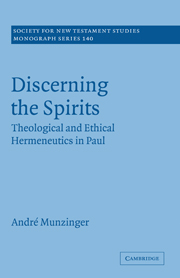1 - The Conceptual Approach
Published online by Cambridge University Press: 26 October 2009
Summary
Why discernment?
Modernity has struggled into the twenty-first century, sharply aware that its previously self-confident profile cannot be taken for granted anymore. Complex questions require immediate and attentive scrutiny: how can the looming worries of a ‘clash of civilisations’ be avoided? Wherein does the dignity of human life lie with respect to its beginning, its end and its relationship to other creatures? How can we evaluate such diverse phenomena as the changing expressions of sexuality, innovations in biotechnology or complex procedures of globalised interdependence? These pressing questions with their universal implications are accompanied by concerns of more personal and spiritual significance for believers of the Christian faith: does the Lord lead individuals in every detail of their lives? Is the will of God clearly defined? Is it easily accessible? How does the Spirit guide each believer personally?
These questions illustrate the interest in and need for discernment in a time far removed from Paul's. So can and should scholarship answer these questions with the aid of Paul? Is he a reliable guide for issues he had not foreseen? If we agree that Paul should be consulted, how concrete or abstract will that help be? Paul has intrigued scholars and believers for centuries with the gift he introduces in 1 Cor. 12.10, the ability to discern the spirits. What did he mean? Is it a secondary issue or a central part of his theology? Is it a gift for all believers or for a few gifted members of the church?
- Type
- Chapter
- Information
- Discerning the SpiritsTheological and Ethical Hermeneutics in Paul, pp. 3 - 18Publisher: Cambridge University PressPrint publication year: 2007



